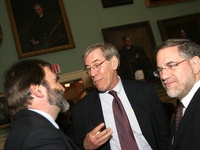
University Provost Steven E. Hyman (right), shown here with William L. Fash (left) and Robert D. Reischauer, stepped down in 2010.
When asked to define her vision last month, University President Drew G. Faust stopped for a moment.
She looked off into the distance, turning the question over in her head during what was a pregnant pause.
Faust needed to think carefully about her answer. Her predecessor Lawrence H. Summers’ staunch desire to implement his own vision had ultimately led to his downfall.
Up until this point, Faust has tiptoed around the question, preferring to outline abstract principles for how she wants to lead.
Her latest response marks a departure from the previous administration, both in style and substance.
Multimedia
“I think the word ‘vision’ is misleading because it suggests something that I dream and then impose as my vision for Harvard,” Faust says. “I believe that Harvard has purposes that are not something that I impose on the University as particular to me, but rather are shared values, priorities, and goals that I help define, articulate, and work to advance.”
Faust’s presidency to this point has been largely reactive, defined in the past year by the University’s collective response to the financial crisis.
Formerly a low-profile dean of a Faculty most heavily dependent on endowment income, Faust had barely settled into Mass. Hall before she was confronted by the deepest recession since the Great Depression.
Painful budget cuts following a precipitous drop in Harvard’s endowment left only her highest priorities intact, providing clues as to the University she envisions. Financial aid, for example, remained untouched by the University’s fiscal magicking.
But Faust, as she herself has said, has many years ahead of her to set a vision that will likely not be limited by a shrinking endowment, but directed by the themes she wants to push.
As the economy stands on the cusp of a recovery, the University must decide how it will situate itself in a changed financial landscape, one much different from the boom years of the early 2000s.
When the endowment rebounds, it will not have been Faust alone who has imposed an agenda. Committees, discussion, and careful consideration are the watch-words of this administration.
As is the phrase, “One University,” meaning an inter-disciplinary approach to solving the world’s problems like health and poverty.
But exactly what this means for Harvard remains shrouded in uncertainty, and for now, Faust hesitates to discuss a more concrete set of plans—especially in Allston.
PRESIDENTIAL CHOICES
Read more in News
The Centralization of FAS













